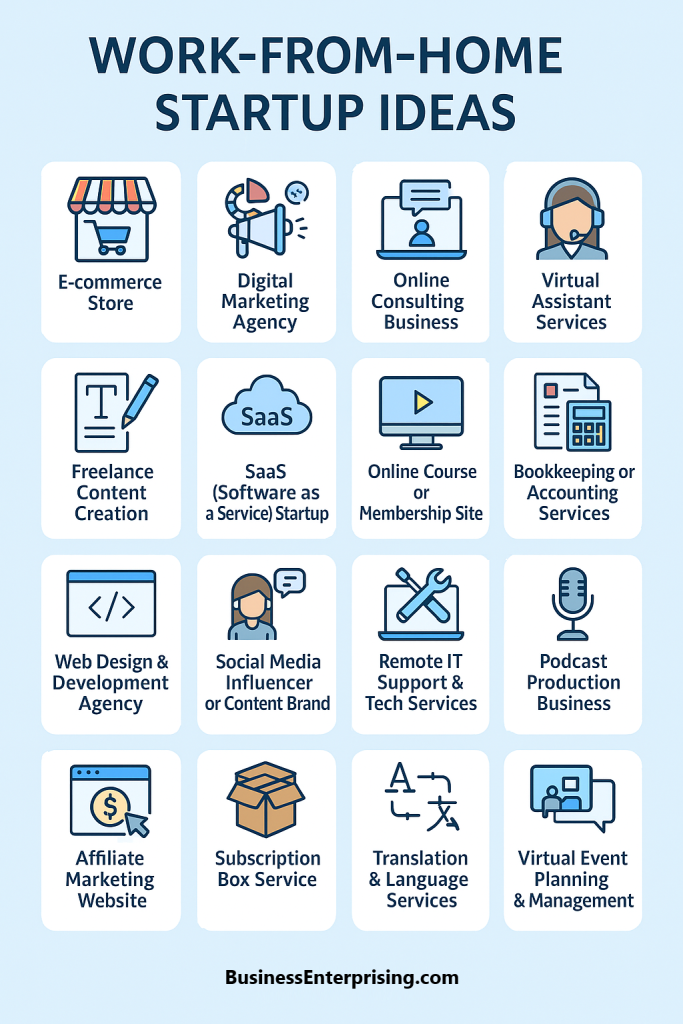 The shift toward remote work has opened numerous remote business opportunities for aspiring entrepreneurs. With advancements in technology and changing work preferences, starting a business from home has become increasingly feasible. This trend allows you to pursue your entrepreneurial ambitions without the constraints of a traditional office setting.
The shift toward remote work has opened numerous remote business opportunities for aspiring entrepreneurs. With advancements in technology and changing work preferences, starting a business from home has become increasingly feasible. This trend allows you to pursue your entrepreneurial ambitions without the constraints of a traditional office setting.
However, transitioning to a remote business model requires careful planning and adaptation. You must consider factors such as effective time management, maintaining team collaboration, and overcoming communication barriers. Additionally, acquiring clients in a virtual environment presents its own set of challenges. By understanding these obstacles and implementing strategic solutions, you can position your business for success.
Furthermore, learning from established work-from-home startups can provide valuable insights. Analyzing their strategies and approaches offers practical lessons that can be applied to your own business endeavors. By embracing the opportunities and addressing the challenges associated with remote entrepreneurship, you can build a resilient and thriving business from the comfort of your home.
The Rise of Remote Entrepreneurship: Why Work-From-Home Startups Are Thriving
Remote entrepreneurship has experienced significant growth, offering you the flexibility to build businesses from home. This shift is driven by advancements in digital technology and evolving work cultures that embrace remote business opportunities.
The COVID-19 pandemic accelerated the adoption of remote work, demonstrating that many tasks can be effectively performed outside traditional office settings. Companies recognized the benefits of flexible work arrangements, leading to a lasting change in how we view work environments. This cultural shift has opened doors for entrepreneurs like you to explore remote business opportunities without the constraints of a physical location.
Digital tools have become indispensable in this landscape. Cloud computing, project management software, and communication platforms enable seamless collaboration and operations from virtually anywhere. These technologies reduce overhead costs and make it easier for you to manage and scale your business remotely.
The global gig economy also plays a crucial role in the rise of remote entrepreneurship. With a growing pool of freelancers and independent contractors available online, you can access a diverse talent pool to support various business functions. This interconnectedness fosters innovation and allows for agile responses to market demands.
As remote work becomes more prevalent, the trend of starting and running businesses from home is expected to continue its upward trajectory. Embracing digital tools and adapting to the evolving work culture positions you to capitalize on the myriad opportunities that remote entrepreneurship offers.
Top Remote Business Models You Can Start from Home
Exploring remote business opportunities allows you to leverage your skills and interests from the comfort of your home. Several business models have proven effective for remote entrepreneurs.
E-commerce stores enable you to sell products online without a physical storefront. Platforms like Shopify and WooCommerce simplify setting up and managing your online shop. You can focus on niche markets or offer a wide range of products.
Digital marketing agencies provide services such as social media management, search engine optimization, and online advertising. As businesses increasingly prioritize their online presence, your expertise can help them navigate the digital landscape effectively.
Online consulting allows you to share your specialized knowledge with clients worldwide. Whether in business strategy, financial planning, or health and wellness, virtual consultations make your services accessible to a broader audience.
Content creation encompasses writing, graphic design, video production, and more. Businesses constantly seek quality content to engage their audiences, presenting opportunities for you to offer these services remotely.
Virtual assistance involves providing administrative support to businesses and entrepreneurs. Tasks may include managing emails, scheduling appointments, and handling customer inquiries. This role is essential for clients looking to streamline operations.
Software as a Service (SaaS) startups develop and offer software solutions via subscription models. By addressing specific market needs, you can build scalable products that generate recurring revenue.
Each of these models offers flexibility and the potential for growth. By aligning your business choice with your skills and market demand, you can create a successful remote enterprise.
Essential Tools & Technology for Running a Remote Business
Running a remote business requires the right digital tools to keep your operations smooth and efficient. By integrating key technologies, you can enhance productivity and maintain clear communication with your team.
Project management software helps you organize tasks, set deadlines, and monitor progress. Platforms like Trello and Asana provide visual interfaces that make tracking projects straightforward. These tools foster collaboration by allowing team members to update statuses and share files in real-time.
Effective communication tools are essential for remote teams. Applications such as Slack and Microsoft Teams facilitate instant messaging, voice calls, and video conferences. These platforms support group discussions and direct messages, ensuring that everyone stays connected and informed.
Managing finances remotely is simplified with accounting platforms like QuickBooks and FreshBooks. These tools enable you to track expenses, generate invoices, and monitor cash flow. With user-friendly dashboards, you can gain insights into your financial health and make informed decisions.
Marketing automation solutions streamline your promotional efforts. Services like Mailchimp and HubSpot allow you to create email campaigns, schedule social media posts, and analyze engagement metrics. By automating repetitive tasks, you can focus on developing strategies to expand your reach.
Additionally, cloud storage services such as Google Drive and Dropbox offer secure file sharing and collaboration. These platforms ensure that your documents are accessible to authorized team members, regardless of their location.
By integrating these essential tools, you position your business to thrive in the evolving landscape of remote business opportunities.
How to Validate and Launch a Profitable Work-From-Home Startup
Starting a work-from-home business offers you the flexibility to pursue entrepreneurial goals with minimal upfront investment. To increase your chances of success, it’s important to validate your business idea before a full-scale launch. This approach helps confirm market demand and refine your offering based on real feedback.
Begin by identifying your target audience and understanding their needs. Engage with potential customers through surveys, interviews, or social media interactions. These conversations provide insights into the problems they face and how your product or service can address them.
Next, analyze your competition to determine what solutions already exist. This research helps you identify gaps in the market and differentiate your offering. By understanding the competitive landscape, you can position your business more effectively.
Developing a minimum viable product (MVP) is a practical step in validation. An MVP is a simplified version of your product that includes core features. Releasing an MVP allows you to test your concept with early adopters and gather valuable feedback. This iterative process enables you to make informed improvements without significant financial commitment.
Additionally, consider leveraging crowdfunding platforms to test market interest and raise initial funds. A successful campaign not only provides capital but also validates your idea by demonstrating customer willingness to pay.
Once you’ve validated your concept, create a detailed business plan outlining your objectives, strategies, and financial projections. A well-structured plan serves as a roadmap, guiding your decisions and attracting potential investors.
By systematically validating your business idea and strategically planning your launch, you position yourself to capitalize on remote business opportunities while minimizing financial risk.
Common Challenges of Running a Remote Business (and How to Overcome Them)
Running a remote business offers flexibility; however, it also presents several challenges that can impact your daily operations. Therefore, addressing these obstacles effectively is essential for long-term success in remote business opportunities.
Additionally, managing your time effectively becomes more complex when your home doubles as your office. As a result, you must establish a structured daily schedule to separate work hours from personal time. Furthermore, utilizing digital calendars and task management apps can help you prioritize tasks and set clear deadlines.
Collaborating with a dispersed team often leads to misaligned goals and misunderstandings. However, regular virtual meetings and clear documentation of workflows can enhance team alignment. Additionally, implementing collaborative platforms allows team members to stay informed and engaged throughout each project.
Moreover, communication barriers such as varying time zones and cultural differences can hinder effective interaction. Therefore, establishing clear communication protocols and selecting appropriate communication tools can mitigate these issues. Encouraging an open communication culture also fosters trust and reduces misunderstandings among your team.
Acquiring clients without a physical presence requires a robust and intentional online strategy. Consequently, developing a strong digital presence through a professional website and active social media engagement can attract potential clients. Additionally, leveraging online networking events and virtual conferences can further expand your reach and visibility.
By proactively addressing these challenges with thoughtful strategies, you can strengthen the efficiency and growth potential of your remote business. Therefore, staying organized, fostering clear communication, and focusing on client acquisition will help you succeed in a remote environment.
Case Studies: Successful Work-From-Home Startups & What You Can Learn From Them
Exploring remote business opportunities can be inspiring, especially when you examine successful work-from-home startups. Moreover, these examples highlight effective strategies and offer valuable insights for your entrepreneurial goals. Therefore, reviewing their experiences can help you avoid common mistakes and adopt proven methods.
For instance, consider the story of Sara Reyes, who transformed a challenging situation into a thriving virtual assistant business. After being made redundant during her pregnancy, Sara leveraged her corporate experience to establish Assist by Sara. Additionally, she reached out to former contacts and emphasized personalized service to build her client base. As a result, she attracted high-profile clients, including multimillion-dollar companies. Her approach underscores the importance of networking and using existing skills to create a successful remote enterprise.
Another example worth mentioning is Hubstaff, founded by Dave Nevogt and Jared Brown in 2012. This company developed a workforce management software suite offering time tracking, proof of work, and payroll management. Furthermore, Hubstaff has operated fully remotely since its inception. Consequently, it has grown to employ over 90 people worldwide. Their success demonstrates the potential of creating digital tools that address the needs of remote teams. Therefore, it emphasizes the growing demand for reliable remote work solutions.
Additionally, Bookminders, established in 1991 by Tom Joseph, provides outsourced bookkeeping services using a home-based workforce. By focusing on flexible work arrangements and leveraging technology, Bookminders has become a premier provider in its field. This case illustrates how adopting innovative work models and prioritizing quality can lead to long-term success in remote business opportunities.
Collectively, these stories highlight the importance of adaptability, leveraging skills, and embracing technology in building successful remote businesses. Therefore, by studying their strategies, you can gain insights to apply to your own entrepreneurial efforts.
Conclusion
Building a work-from-home startup can be one of the most practical ways to pursue your entrepreneurial goals. However, starting and managing a remote business requires strategy, effort, and the right mindset. As a result, you will encounter challenges that test your discipline and planning. But with preparation, you can overcome them and grow a sustainable operation.
Additionally, remote business opportunities continue to expand as digital technology evolves and reshapes how people work. More people now recognize the advantages of working from home and launching their own ventures. Therefore, you can leverage this trend to build a profitable and flexible business. Whether you focus on e-commerce, consulting, or software, opportunities exist across industries.
However, success does not happen by accident or luck. Instead, you must begin with thorough market research to understand what your customers need. Additionally, validating your product or service before launch will reduce your financial risk. As a result, these early steps will save you time, money, and frustration.
Once you launch, you will need reliable digital tools to manage your business efficiently. Project management apps, communication platforms, and accounting software will simplify daily operations. Therefore, investing time to learn these systems can improve your productivity and reduce mistakes. Moreover, many tools offer free or low-cost plans that support new businesses.
Additionally, you must address common remote business challenges like time management, communication barriers, and client acquisition. Building clear workflows and communication routines will help maintain efficiency and transparency. Therefore, staying organized and disciplined is essential when working from home.
You can also learn from successful entrepreneurs who started their businesses remotely and grew them sustainably. Their experiences offer practical lessons about perseverance, flexibility, and smart decision-making. Therefore, use their examples as motivation when building your startup.



